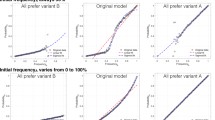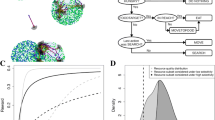Abstract
Long before the origins of agriculture human ancestors had expanded across the globe into an immense variety of environments, from Australian deserts to Siberian tundra. Survival in these environments did not principally depend on genetic adaptations, but instead on evolved learning strategies that permitted the assembly of locally adaptive behavioral repertoires. To develop hypotheses about these learning strategies, we have modeled the evolution of learning strategies to assess what conditions and constraints favor which kinds of strategies. To build on prior work, we focus on clarifying how spatial variability, temporal variability, and the number of cultural traits influence the evolution of four types of strategies: (1) individual learning, (2) unbiased social learning, (3) payoff-biased social learning, and (4) conformist transmission. Using a combination of analytic and simulation methods, we show that spatial—but not temporal—variation strongly favors the emergence of conformist transmission. This effect intensifies when migration rates are relatively high and individual learning is costly. We also show that increasing the number of cultural traits above two favors the evolution of conformist transmission, which suggests that the assumption of only two traits in many models has been conservative. We close by discussing how (1) spatial variability represents only one way of introducing the low-level, nonadaptive phenotypic trait variation that so favors conformist transmission, the other obvious way being learning errors, and (2) our findings apply to the evolution of conformist transmission in social interactions. Throughout we emphasize how our models generate empirical predictions suitable for laboratory testing.






Similar content being viewed by others
References
Aoki, K. (2010). Evolution of the social-learner-explorer strategy in an environmentally heterogeneous two-island model. Evolution, 64(9), 2575–2586. doi:10.1111/j.1558-5646.2010.01017.x.
Aoki, K., & Nakahashi, W. (2008). Evolution of learning in subdivided populations that occupy environmentally heterogeneous sites. Theoretical Population Biology, 74(4), 356–368. doi:10.1016/j.tpb.2008.09.006.
Barth, F. (1965). Political leadership among Swat Pathans. Toronto: Oxford University Press.
Bell, A. V., Richerson, P. J., & McElreath, R. (2009). Culture rather than genes provides greater scope for the evolution of large-scale human prosociality. Proceedings of the National Academy of Sciences (USA), 106(42), 17671–17674. doi:10.1073/pnas.0903232106.
Boyd, R., & Richerson, P. J. (1985). Culture and the evolutionary process. Chicago: University of Chicago Press.
Boyd, R., & Richerson, P. J. (1987). The evolution of ethnic markers. Cultural Anthropology, 2(1), 27–38.
Boyd, R., Gintis, H., Bowles, S., & Richerson, P. J. (2003). The evolution of altruistic punishment. Proceedings of the National Academy of Sciences (USA), 100(6), 3531–3535.
Boyd, R., Gintis, H., & Bowles, S. (2010). Coordinated punishment of defectors sustains cooperation and can proliferate when rare. Science, 328(5978), 617–620.
Boyd, R., Richerson, P. J., & Henrich, J. (2011). Rapid cultural adaptation can facilitate the evolution of large-scale cooperation. Behavioral Ecology and Sociobiology, 65(3), 431–444.
Cavalli-Sforza, L. L., & Feldman, M. W. (1981). Cultural transmission and evolution: A quantitative approach. Princeton: Princeton Univ. Press.
Chudek, M., Heller, S., Birch, S., & Henrich, J. (2012). Prestige-biased cultural learning: bystander’s differential attention to potential models influences children’s learning. Evolution and Human Behavior, 33(1), 46–56.
Collard, M., Shennan, S. J., & Tehrani, J. J. (2006). Branching, blending, and the evolution of cultural similarities and differences among human populations. Evolution and Human Behavior, 27(3), 169–184.
Currie, T. E., & Mace, R. (2009). Political complexity predicts the spread of ethnolinguistic groups. Proceedings of the National Academy of Sciences (USA), 106(18), 7339–7344. doi:10.1073/pnas.0804698106.
Durham, W. (1991). Coevolution: Genes, culture, and human diversity. Stanford: Stanford University Press.
Edgerton, R. B. (1992). Sick societies: Challenging the myth of primitive harmony. New York: Free Press.
Efferson, C., Lalive, R., & Fehr, E. (2008). The coevolution of cultural groups and ingroup favoritism. Science, 321(5897), 1844–1849.
Efferson, C., Lalive, R., Richerson, P. J., McElreath, R., & Lubell, M. (2008). Conformists and mavericks: the empirics of frequency-dependent cultural transmission. Evolution and Human Behavior, 29(1), 56–64. doi:10.1016/j.evolhumbehav.2007.08.003.
Eriksson, K., Enquist, S., & Ghirlanda, S. (2007). Critical point in current theory of conformist social learning. Journal of Evolutionary Psychology, 5, 67–87.
Fried, M. (1967). The evolution of political society: An essay in political anthropology. New York: Random House.
Gadgil, M., & Malhotra, K. C. (1983). Adaptive significance of the Indian caste system: an ecological perspective. Annals of Human Biology, 10(5), 465–478.
Galef, B. G., & Whiskin, E. E. (2008). Use of social information by sodium- and protein-deficient rats: test of a prediction (Boyd & Richerson 1988). Animal Behaviour, 75, 627–630.
Gintis, H., Smith, E. A., & Bowles, S. (2001). Costly signaling and cooperation. Journal of Theoretical Biology, 213(1), 103–119.
Guzman, R. A., Rodriguez-Sickert, C., & Rowthorn, R. (2007). When in Rome, do as the Romans do: the coevolution of altruistic punishment, conformist learning, and cooperation. Evolution and Human Behavior, 28(2), 112–117.
Hagen, E. H., & Hammerstein, P. (2006). Game theory and human evolution: a critique of some recent interpretations of experimental games. Theoretical Population Biology, 69(3), 339–348.
Harris, P. L., & Corriveau, K. H. (2011). Young children’s selective trust in informants. Philosophical Transactions of the Royal Society B: Biological Sciences, 366(1567), 1179–1187.
Henrich, J. (2004). Cultural group selection, coevolutionary processes and large-scale cooperation. Journal of Economic Behavior & Organization, 53, 3–35.
Henrich, J., & Boyd, R. (1998). The evolution of conformist transmission and the emergence of between-group differences. Evolution and Human Behavior, 19, 215–242.
Henrich, J., & Boyd, R. (2001). Why people punish defectors: weak conformist transmission can stabilize costly enforcement of norms in cooperative dilemmas. Journal of Theoretical Biology, 208, 79–89.
Henrich, J., & Boyd, R. (2002). On modeling cultural evolution: why replicators are not necessary for cultural evolution. Journal of Cognition and Culture, 2(2), 87–112.
Henrich, J., & Boyd, R. (2008). Division of labor, economic specialization, and the evolution of social stratification. Current Anthropology, 49(4), 715–724.
Henrich, J., & Broesch, J. (2011). On the nature of cultural transmission networks: evidence from Fijian villages for adaptive learning biases. Philosophical Transactions of the Royal Society, 366, 1139–1148.
Henrich, J., & Gil-White, F. (2001). The evolution of prestige: freely conferred deference as a mechanism for enhancing the benefits of cultural transmission. Evolution and Human Behavior, 22(3), 165–196.
Henrich, J., & Henrich, N. (2010). The evolution of cultural adaptations: Fijian taboos during pregnancy and lactation protect against marine toxins. Proceedings of the Royal Society B: Biological Sciences, published online at http://rspb.royalsocietypublishing.org/content/early/2010/07/26/rspb.2010.1191.short?rss=1.
Henrich, J., & McElreath, R. (2007). Dual inheritance theory: The evolution of human cultural capacities and cultural evolution. In R. Dunbar & L. Barrett (Eds.), Oxford handbook of evolutionary psychology (pp. 555–570). Oxford: Oxford University Press.
Henrich, N., & Henrich, J. (2007). Why humans cooperate: A cultural and evolutionary explanation. Oxford: Oxford University Press.
Johnson, A. (1995). A Guttman scale analysis of Matsigenka men’s manufacturing skills. Cultural Anthropology Methods, 7, 1–3.
Kameda, T., & Nakanishi, D. (2002). Cost-benefit analysis of social/cultural learning in a nonstationary uncertain environment: an evolutionary simulation and an experiment with human subjects. Evolution and Human Behavior, 23, 373–393.
Kandler, A., & Laland, K. N. (2009). An investigation of the relationship between innovation and cultural diversity. Theoretical Population Biology, 76(1), 59–67. doi:10.1016/j.tpb.2009.04.004.
Kendal, J., Giraldeau, L. A., & Laland, K. (2009). The evolution of social learning rules: payoff-biased and frequency-dependent biased transmission. Journal of Theoretical Biology, 260(2), 210–219.
Laland, K. N. (2004). Social learning strategies. Learning & Behavior, 32(1), 4–14.
Laland, K. N., Atton, N., & Webster, M. M. (2011). From fish to fashion: experimental and theoretical insights into the evolution of culture. Philosophical Transactions of the Royal Society B: Biological Sciences, 366(1567), 958–968.
Lipo, C. P., O’Brien, M. J., Collard, M., & Shennan, S. (Eds.). (2006). Mapping our ancestors. Piscataway: AldineTransaction.
McElreath, R., & Strimling, P. (2008). When natural selection favors imitation of parents. Current Anthropology, 49(2), 307–316. doi:10.1086/524364.
McElreath, R., Boyd, R., & Richerson, P. J. (2003). Shared norms and the evolution of ethnic markers. Current Anthropology, 44(1), 122–129.
McElreath, R., Bell, A. V., Efferson, C., Lubell, M., Richerson, P. J., & Waring, T. (2008). Beyond existence and aiming outside the laboratory: estimating frequency-dependent and pay-off-biased social learning strategies. Philosophical Transactions of the Royal Society B: Biological Sciences, 363(1509), 3515–3528. doi:10.1098/rstb.2008.0131.
Mesoudi, A. (2009). How cultural evolutionary theory can inform social psychology and vice versa. Psychological Review, 116(4), 929–952.
Nakahashi, W. (2007a). The evolution of conformist transmission in social learning when the environment changes periodically. Theoretical Population Biology, 72(1), 52–66. doi:10.1016/j.tpb.2007.03.003.
Nakahashi, W. (2007b). The evolution of conformist transmission in social learning when the environment fluctuates. PhD thesis, University of Tokyo.
Panchanathan, K., & Boyd, R. (2004). Indirect reciprocity can stabilize cooperation without the second-order free rider problem. Nature, 432, 499–502.
Rendell, L., Hoppitt, W., & Kendall, J. (2007). Is all learning innovation? The Behavioral and Brain Sciences, 30(4), 421–422.
Rendell, L., Fogarty, L., Hoppitt, W. J. E., Morgan, T. J. H., Webster, M. M., & Laland, K. N. (2011). Cognitive culture: theoretical and empirical insights into social learning strategies. Trends in Cognitive Sciences, 15(2), 68–76.
Schlag, K. H. (1998). Why imitate, and if so, how? A boundedly rational approach to multi-armed bandits. Journal of Economic Theory, 78, 130–156.
Schlag, K. H. (1999). Which one should I imitate? Journal of Mathematical Economics, 31(4), 493–527.
Stenberg, G. (2009). Selectivity in infant social referencing. Infancy, 14(4), 457–473.
Wakano, J. Y., & Aoki, K. (2006). A mixed strategy model for the emergence and intensification of social learning in a periodically changing natural environment. Theoretical Population Biology, 70(4), 486–497. doi:10.1016/j.tpb.2006.04.003.
Wakano, J. Y., & Aoki, K. (2007). Do social learning and conformist bias coevolve? Henrich and Boyd revisited. Theoretical Population Biology, 72(4), 504–512. doi:10.1016/j.tpb.2007.04.003.
Wakano, J. Y., Aoki, K., & Feldman, M. W. (2004). Evolution of social learning: a mathematical analysis. Theoretical Population Biology, 66(3), 249–258. doi:10.1016/j.tpb.2004.06.005.
Whitehead, H. (2007). Learning, climate and the evolution of cultural capacity. Journal of Theoretical Biology, 245(2), 341–350. doi:10.1016/j.jtbi.2006.10.001.
Whitehead, H., & Richerson, P. J. (2009). The evolution of conformist social learning can cause population collapse in realistically variable environments. Evolution and Human Behavior, 30(4), 261–273. doi:10.1016/j.evolhumbehav.2009.02.003.
Acknowledgments
WN and JYW are partly supported by the Meiji University Global COE Program “Formation and Development of Mathematical Sciences Based on Modeling and Analysis” and by MEXT grant No. 22101004 “Replacement of Neanderthals by Modern Humans: Testing Evolutionary Models of Learning.” JYW is partly supported by JST PRESTO and by JSPS KAKENHI No. 20770019. JH thanks the MECC laboratory, Richard McElreath, and Michael Muthukrishna for helpful comments. JH was supported by the CIFAR, the Canadian Institute for Advanced Research.
Author information
Authors and Affiliations
Corresponding author
Electronic Supplementary Material
Below is the link to the electronic supplementary material.
Supplementary Material
(PDF 236 kb)
Rights and permissions
About this article
Cite this article
Nakahashi, W., Wakano, J.Y. & Henrich, J. Adaptive Social Learning Strategies in Temporally and Spatially Varying Environments. Hum Nat 23, 386–418 (2012). https://doi.org/10.1007/s12110-012-9151-y
Published:
Issue Date:
DOI: https://doi.org/10.1007/s12110-012-9151-y




